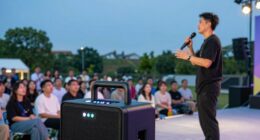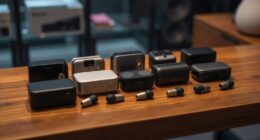Managing mental health in the Deaf community involves addressing social isolation and communication barriers. Engaging in Deaf-friendly activities, like cooking classes and art workshops, can boost connections and promote well-being. It’s important to utilize local resources and support groups tailored for Deaf individuals. Effective communication using visual aids and ASL enhances understanding and engagement. By fostering community connections and practicing self-care, you can improve your mental health. There’s much more to uncover about these valuable resources.
Key Takeaways
- Engage in Deaf-friendly cooking classes and workshops to enhance culinary skills and foster social connections, promoting overall mental well-being.
- Utilize visual aids and collaborate with ASL interpreters to ensure effective communication and access to mental health resources.
- Participate in community cultural events and art programs to combat social isolation and reinforce pride in Deaf identity.
- Connect with support groups and local resources specifically designed for the Deaf community to share experiences and reduce feelings of isolation.
- Practice self-care through mindfulness, exercise, and creative expression to promote mental health and resilience within the Deaf community.
Deaf Community’s Unique Challenges
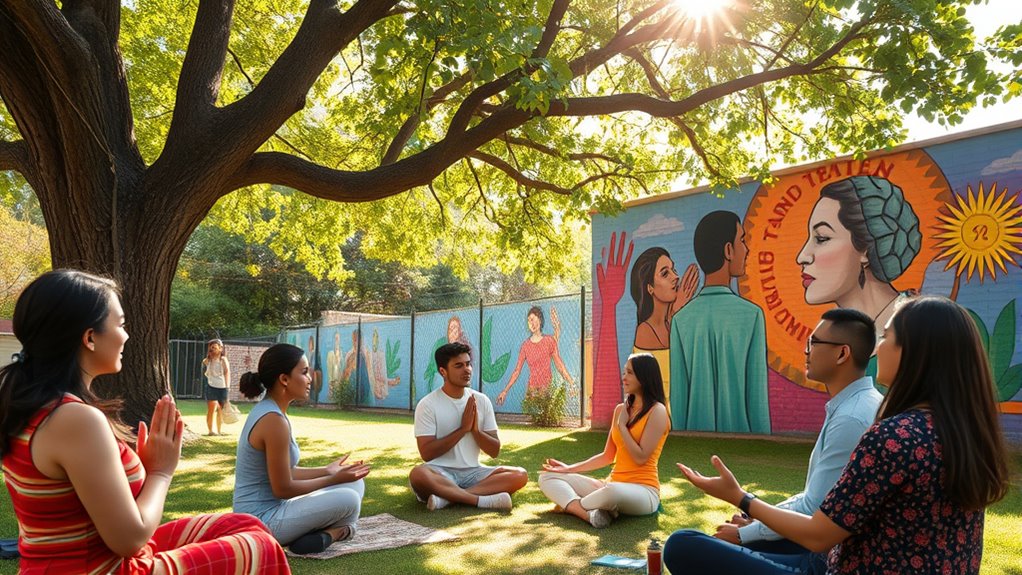
Cooking classes designed specifically for the deaf community can be a fun and engaging way to build skills while fostering social connections. By using visual instructions and ASL, you’ll find it easier to communicate and bond with others who share similar experiences. These classes not only enhance culinary skills but also help combat social isolation, promoting overall mental well-being. Additionally, these classes address language access barriers that often hinder deaf individuals from fully participating in community activities. Moreover, engaging in such activities can help mitigate caregiver burnout, which is a common issue faced within families supporting deaf individuals. Providing routine health checks in these classes can also help participants stay informed about their overall well-being. Furthermore, incorporating positive reinforcement techniques in group activities can further strengthen social bonds among participants. Cooking together can also provide an opportunity to learn about nutritional requirements that are essential for maintaining a healthy lifestyle.
Deaf-Friendly Cooking Classes
While traditional cooking classes can be intimidating for Deaf individuals, creating Deaf-friendly environments can greatly enhance participation and enjoyment in culinary activities.
By addressing communication barriers through sign language interpreters and visual aids, you’ll foster a more inclusive atmosphere. Ensuring resources are accessible, like clear labeling and technology integration, can empower you to engage more fully. ASL Recipe Swaps promote a deeper understanding and appreciation of Deaf culture, enriching the overall cooking experience. Additionally, incorporating essential oils for mental well-being can further enhance the cooking experience by promoting relaxation and reducing anxiety. Offering digital literacy programs can also help participants learn new skills and connect with technology in meaningful ways. It is essential to create an environment that prioritizes accessible resources to support diverse learning styles. Relationships in the Deaf community can face unique challenges, including emotional manipulation that may impact mental health.
Deaf-friendly classes promote cultural awareness, building community bonds and reducing social isolation. You’ll gain valuable educational opportunities while learning to cook.
These classes also tackle mental health challenges, providing a supportive space that mitigates anxiety and depression. Embracing Deaf culture in culinary settings not only enriches your experience but also enhances overall well-being in the Deaf community.
Vibrant Deaf-Friendly Communities
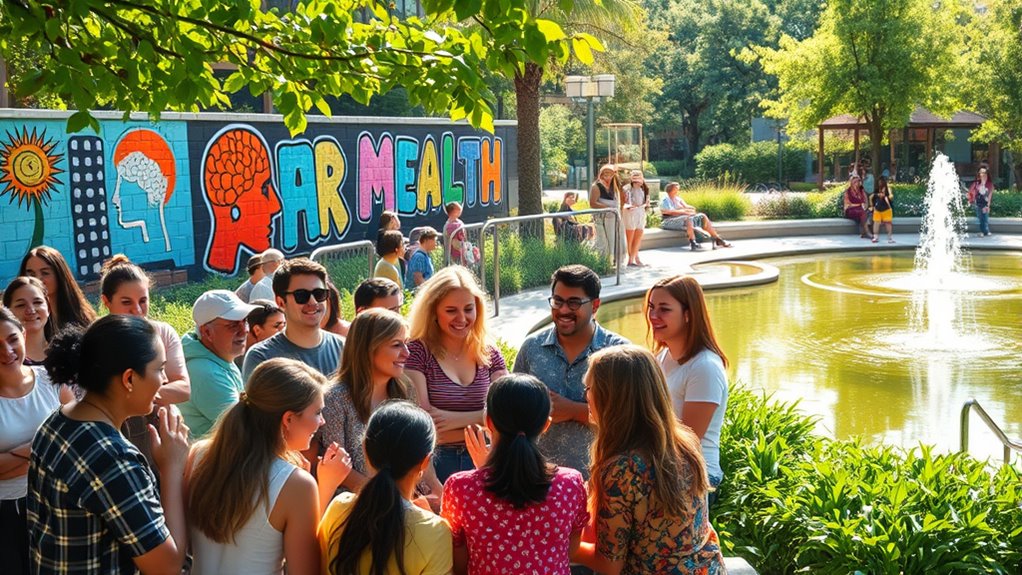
In a vibrant Deaf-friendly community, cultural centers for the Deaf play an essential role in fostering connection and creativity. You might find underrated local art studios that showcase Deaf talent and encourage artistic expression. These centers not only enhance accessibility for Deaf individuals but also promote a deeper understanding of Deaf culture within the broader community. Additionally, community support can greatly enhance the mental well-being of Deaf individuals by providing spaces for shared experiences and mutual understanding. Engaging in activities, such as art programs, can significantly contribute to emotional well-being and overall mental health. Furthermore, participating in supportive environments can cultivate strong communication skills, which are vital for fostering meaningful connections. The integration of high-quality equipment in creative spaces can also elevate the artistic output of Deaf artists, fostering a richer cultural exchange.
Cultural Centers for the Deaf
Cultural centers for the Deaf serve as vital hubs within vibrant Deaf-friendly communities, offering essential resources and support tailored to the needs of deaf and hard of hearing individuals. These centers provide a range of services, guaranteeing language accessibility through American Sign Language (ASL) and fostering community engagement. Additionally, the only full-service community center for the Deaf in Northeast Ohio is CCDHH, which plays a crucial role in supporting local residents. Professional counseling can also be an invaluable resource for individuals seeking to manage their mental health within these communities. Furthermore, these centers often collaborate with assistance programs to provide financial aid and support for families navigating challenges related to deafness. As these centers promote faith and resilience, they also encourage individuals to seek spiritual guidance and support in their mental health journey. It is also essential for these centers to focus on emotional expression as a means to help individuals cope with their unique experiences and feelings.
| Resource Type | Services Offered | Community Impact |
|---|---|---|
| Community Support | Social services, educational programs | Builds a sense of belonging |
| Language Accessibility | ASL interpretation | Reduces communication barriers |
| Regional Coverage | Multi-county support | Expands access to resources |
| Funding & Partnerships | Collaborations with foundations | Guarantees sustainability |
| Cultural Events | Performances, social activities | Celebrates Deaf culture |
Underrated Local Art Studios
As you explore the vibrant Deaf-friendly communities, you’ll discover underrated local art studios that serve as creative sanctuaries for Deaf artists. Places like the Dyer Arts Center and Deaf Spotlight provide essential platforms for showcasing diverse artistic voices. These studios host group exhibitions and community events, fostering connections among artists and audiences alike. You might also find unique opportunities at the Anderson Center Residency, where cultural exchange flourishes. Local initiatives, such as collaborative workshops, encourage hands-on learning and innovation, while ASL tours at renowned museums enhance appreciation for Deaf artistry. Engaging with these spaces not only nurtures creativity but also combats social isolation, supporting mental health through shared artistic expression and community bonding. Additionally, the Dyer Arts Center features a large collection of works by Deaf and hard of hearing artists, enriching the local art scene further. Moreover, participating in nighttime meditation sessions offered in these studios can improve relaxation and overall mental clarity, which is essential for fostering creative expression. By engaging in these artistic communities, individuals can also work on resetting and recovering, enhancing their mental health through shared experiences and support. Participating in these activities promotes unconditional love among community members, deepening connections and fostering a sense of belonging.
Use Visual Aids Effectively
While steering through mental health discussions in the Deaf community, using visual aids effectively can greatly enhance understanding and engagement. Incorporating captions, diagrams, and pictures in therapy sessions helps bridge communication gaps, making concepts more accessible. Furthermore, communication barriers significantly hinder mental health access, making the use of visual aids even more crucial. When you use visual aids, you create a richer, more engaging experience that resonates with Deaf clients. Additionally, fostering creative practice through the use of visual tools can encourage innovative methods of expression and understanding. Moreover, understanding the importance of emotional stability is essential when addressing mental health needs in diverse communities. Working with ASL interpreters and leveraging technology like video conferencing can further facilitate clear communication. Furthermore, quality assurance processes in mental health services can help ensure that the support provided meets the specific needs of Deaf individuals.
Deaf-Centric Culinary Workshops

Deaf-centric culinary workshops offer a fantastic opportunity to explore cultural heritage plates, artisan wine tastings, and gourmet cooking demonstrations. You’ll not only learn new cooking skills but also connect with others who appreciate similar culinary traditions. These experiences can enhance your sense of community while promoting mental well-being through shared enjoyment of food. Additionally, these workshops can help address the significant lack of accessible MH and SU services for the Deaf community by fostering connections and support among participants.
Cultural Heritage Plates
Culinary workshops that celebrate cultural heritage offer an engaging way for you to explore and connect with the rich traditions of the Deaf community. These workshops create a platform for Deaf individuals to share their culinary heritage, blending traditional recipes with modern twists. You’ll experience visual storytelling as Deaf chefs present dishes that are as appealing to the eyes as they’re to the palate. Sign Language integration fosters inclusivity, ensuring everyone can fully engage. Through hands-on training and cultural presentations, you’ll deepen your understanding while mastering new skills. These workshops not only promote social connection and stress relief but also build confidence and pride in Deaf culture, contributing positively to your mental health. Additionally, participants can benefit from culinary skills training aimed at increasing employability in the restaurant industry.
Artisan Wine Tastings
Artisan wine tastings offer a unique opportunity to explore the world of wine and food pairing through a Deaf-centric lens, making the experience both accessible and engaging. These tastings incorporate Sign Language and visual aids, breaking down communication barriers often present in traditional settings. You’ll enjoy hands-on workshops where Deaf chefs and wine experts use visual storytelling to share their knowledge. Educational sessions on wine and food pairing, conducted in ASL, enhance understanding and foster inclusivity. By collaborating with the Deaf community, these events guarantee that everyone, Deaf and hearing alike, can participate and learn together. Ultimately, artisan wine tastings provide a sensory experience that celebrates culture while promoting mental well-being through community engagement. The inclusion of trust as a moral foundation encourages a supportive atmosphere that benefits all participants.
Gourmet Cooking Demonstrations
When you’re diving into gourmet cooking demonstrations designed for the Deaf community, you’ll find an engaging mix of inclusivity and cultural tradition.
These Deaf-centric workshops create an accessible environment where you can learn cooking techniques using Sign Language. By blending heritage with modern culinary skills, you’ll discover the cultural significance of Deaf culinary traditions. Recent research highlights the importance of inclusive language in health communication, which is reflected in the way these workshops are structured.
You’ll also connect with Deaf chefs and vendors, fostering community engagement. The workshops emphasize visual presentation, enhancing your dining experience while providing essential soft skills for success in the culinary industry.
Plus, technology plays a key role, offering mobile app translations and real-time feedback.
Ultimately, these demonstrations not only develop your culinary skills but also promote a deeper understanding between Deaf and hearing communities.
Must-See Sights

When exploring the rich culture of the deaf community, you can’t miss the historic deaf schools that shaped education and advocacy. Stunning mountain viewpoints offer breathtaking scenery, while interactive deaf art exhibits provide a unique glimpse into the artistic expressions of deaf individuals. Don’t forget to attend deaf cultural events, where you can celebrate and connect with the community. These gatherings also highlight the importance of cultural competency in understanding the diverse experiences and needs of DHH individuals.
Historic Deaf Schools
Exploring historic deaf schools offers a unique glimpse into the rich legacy of deaf education and culture in the U.S.
The American School for the Deaf, founded in 1817 in Hartford, Connecticut, was the first permanent school for deaf children. Pioneers Thomas Hopkins Gallaudet and Laurent Clerc introduced French sign language methods, which evolved into American Sign Language (ASL). This school not only provided education in core subjects but also vocational training, shaping a self-aware community of deaf individuals. Its architecture reflects its pioneering role, accommodating both educational and residential needs. The school’s establishment marked a significant educational milestone, influencing the development of communication strategies for the deaf.
The school’s influence extended nationwide, inspiring over twenty similar institutions by 1850, leaving an enduring legacy in the domain of disability education and cultural identity.
Stunning Mountain Viewpoints
While mountain viewpoints are often synonymous with breathtaking beauty, some locations stand out for their unparalleled vistas that leave visitors in awe.
At Matterhorn Glacier Paradise in Switzerland, you’ll stand at 14,692 feet, taking in panoramic views of the iconic Matterhorn. Year-round snow-capped peaks provide a stunning backdrop for skiing and paragliding adventures.
Mount Kilimanjaro in Tanzania offers stunning landscapes from Africa’s highest peak, while Mount Rainier near Seattle showcases glaciated peaks and vibrant meadows.
Don’t miss Japan’s Mount Fuji, an active volcano surrounded by serene lakes and hot springs.
Finally, Denali in the U.S. invites you to explore its unique wildlife and flora.
Each of these breathtaking viewpoints promises unforgettable experiences and stunning photos that you’ll cherish forever.
Interactive Deaf Art Exhibits
As you explore the world of interactive deaf art exhibits, you’ll discover a vibrant fusion of creativity and technology that resonates with both deaf and hearing audiences.
These exhibits utilize diverse mediums—like painting, sculpture, and digital art—while integrating technology to enhance accessibility. You can engage with virtual reality installations that offer immersive experiences or interactive sculptures that respond to your movements. Deaf art uniquely captures the perspectives and experiences of the deaf community, enriching the overall narrative of the exhibits.
With features like sign language integration, captions, and audio descriptions, these exhibits guarantee everyone can appreciate the art.
As you participate in these multisensory experiences, you’ll not only enjoy the creativity but also connect with the cultural significance of deaf art, fostering community and promoting mental well-being in the process.
Don’t miss these transformative experiences!
Attend Deaf Cultural Events
Interactive deaf art exhibits not only showcase creativity but also serve as a gateway to deeper cultural experiences.
Attending Deaf cultural events can greatly enhance your sense of belonging and mental well-being. These gatherings foster community, allowing you to share stories and connect with others who understand your experiences. Engaging in these events also helps combat collective trauma, as they provide a supportive environment for healing and validation.
Here are some must-see sights to explore:
- Deaf Clubs and Community Groups: These spaces provide social support, cultural preservation, and opportunities for friendship.
- Festivals Celebrating Deaf Culture: Enjoy performances and activities that highlight sign language and Deaf identity.
- Workshops and Educational Seminars: Gain insights into communication strategies and the unique challenges faced by the Deaf community.
Engaging in these events empowers you and reinforces your pride as part of the Deaf community.
Practical Tips
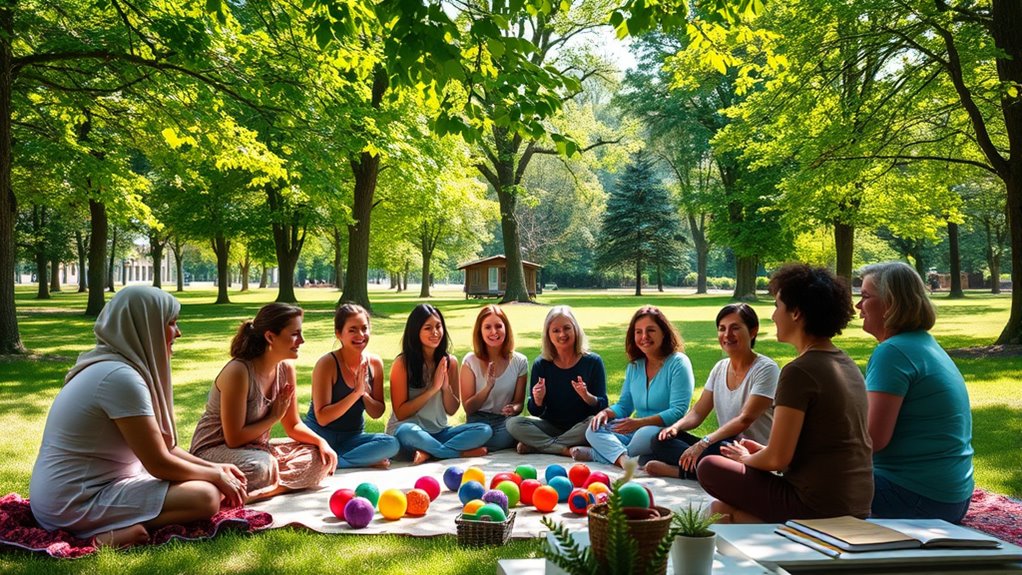
When you’re planning to explore resources for mental health in the Deaf community, it helps to know how to navigate your options. Consider factors like getting there, local transportation, and the best times to access services. Understanding where to stay and the local etiquette can also enhance your experience and comfort. Additionally, be aware that having a language-concordant clinician can significantly improve communication and understanding during your mental health appointments.
Getting There
To effectively manage mental health within the Deaf community, it’s essential to build strong connections with others. Staying socially engaged can greatly reduce feelings of isolation and loneliness.
Here are some practical tips to help you connect:
- Reach out: Stay in touch with friends, family, or support groups within the Deaf community.
- Join groups: Participate in Deaf community organizations or online forums for mutual support.
- Attend events: Engage in cultural events that celebrate Deaf culture and promote social interactions. Additionally, consider joining support groups that foster relationships for emotional support.
Incorporating these practices into your life can enhance your mental well-being.
Getting Around
Maneuvering public transportation can feel overwhelming, especially for Deaf individuals who face unique challenges.
To make your journey smoother, take advantage of mobile apps like MYmta for real-time information and trip planning. Look for public transportation that complies with ADA laws, ensuring equal access.
Don’t hesitate to request communication aids, including ASL interpreters or real-time captioning. Use information screens and closed captioning for updates on schedules.
Consider using voice-to-text technology and vibration alerts to stay informed about service disruptions. Make sure to utilize priority seating when needed.
Finally, seek out staff trained in sign language to improve communication. These practical tips can greatly enhance your experience while maneuvering public transportation.
Best Time to Visit
Choosing the best time to visit the Deaf community can greatly enhance your mental health experience. Consider aligning your visit with events that promote mental well-being, such as Mental Health Awareness Week. This creates opportunities for connection and support.
Additionally, engaging with community activities can help you build relationships and reduce feelings of isolation. Effective communication is crucial, as many members of the deaf community face communication barriers when seeking mental health support.
- Seek out local support groups to connect with others.
- Look for workshops on mindfulness and self-care practices.
- Use resources available in British Sign Language (BSL) for effective communication.
Where to Stay
Finding the right place to stay can greatly impact your experience in the Deaf community. Look for deaf-friendly housing that prioritizes accessibility and emotional support. Living near other deaf individuals fosters connections that enhance your mental well-being. Make sure that mental health facilities are designed with accessibility features and employ culturally competent, sign-fluent staff. Don’t hesitate to ask about interpreter services, as effective communication is essential in mental health settings. Language deprivation contributes to higher risks for mood and anxiety disorders among DHH individuals, so stay informed about local resources and support groups tailored for the Deaf community. Advocate for your needs and seek out environments that respect cultural diversity. By choosing the right accommodations, you’ll create a supportive space that nurtures your mental health and fosters connection within the community.
Local Etiquette
How can you navigate local etiquette within the Deaf community effectively? Understanding and respecting communication norms is essential. Here are some practical tips to enhance your interactions:
- Use Facial Expressions: They help convey emotions and clarify your message.
- Speak Clearly: Enunciate your words without shouting, as this can be perceived as rude. Clear communication methods are vital for fostering understanding.
- Raise Hands in Group Settings: This allows for orderly conversations and helps everyone follow along.
Avoid common pitfalls like shouting or using exclusionary phrases. Always be respectful of personal boundaries and communication preferences.
Pro Tip
Maneuvering local etiquette in the Deaf community sets a solid foundation for effective interactions, but there are practical tips you can apply to further enhance your experience.
First, connect with your peers by joining support groups or attending Deaf-friendly events. This reduces feelings of isolation and fosters community.
Consider finding a counselor fluent in ASL to guarantee effective communication during therapy. This is particularly important as deaf individuals experience mental health risks more frequently than their hearing counterparts.
Don’t shy away from utilizing online resources; forums and social media can be valuable for support and connection.
Also, practice self-care through mindfulness, exercise, and creative expression.
Finally, stay informed about mental health resources tailored to the Deaf community, and advocate for accessible services when needed.
Your mental well-being is worth the effort!
Frequently Asked Questions
How Can I Find a Mental Health Professional Who Knows Sign Language?
To find a mental health professional who knows sign language, you can start by using online platforms like Psychology Today or the SAMHSA Treatment Locator.
These tools let you filter for ASL-fluent therapists. You might also check resources like National Deaf Therapy for specialized listings.
Consider reaching out to local advocacy groups that support Deaf individuals, as they often have recommendations for qualified professionals in your area.
Don’t hesitate to request an interpreter if needed.
What Resources Are Available for Deaf Individuals Experiencing Anxiety?
If you’re feeling anxious, there are several resources you can tap into.
You can reach out to hotlines that offer immediate support, like texting “HOME” to 741741 for free, 24/7 assistance.
The Deaf Crisis Line provides crisis counseling via videophone and text, ensuring you communicate comfortably.
Don’t forget about online support groups, too; they can help you connect with others facing similar challenges.
Are There Support Groups Specifically for Deaf Mental Health Issues?
Yes, there are support groups specifically for mental health issues.
You can connect with organizations like Deaf Counseling Advocacy and Referral Agency (DCARA) or explore local community centers that host group sessions.
Online platforms also offer virtual support groups tailored for Deaf individuals.
Engaging with these groups can help you share experiences, gain insights, and find comfort in knowing you’re not alone in your struggles.
Don’t hesitate to reach out for support!
How Does Culture Affect Mental Health in the Deaf Community?
Imagine a tree with deep roots in rich soil, representing how culture shapes mental health. Your cultural identity influences your thoughts and feelings, creating a framework for understanding experiences.
For you, being part of a cultural minority can bring both pride and challenges. When society invalidates your culture, it can affect your self-esteem and mental well-being.
Embracing your unique identity and finding community support can strengthen your mental health and resilience.
What Are Common Misconceptions About Deaf Individuals and Mental Health?
Many people mistakenly see deafness solely as a disability, overlooking that many deaf individuals don’t identify this way. They often don’t have learning disabilities; with the right support, they thrive academically and professionally.
Miscommunication in healthcare can lead to misdiagnoses, while societal stereotypes contribute to mental health struggles. Additionally, some assume deaf individuals can’t experience auditory hallucinations, misunderstanding how their perceptions differ.
Recognizing these misconceptions is essential to fostering a more supportive environment.
Conclusion
In the tapestry of life, each thread represents a unique experience, especially in the deaf community. By nurturing vibrant spaces and fostering connections, you weave a supportive environment that’s as rich as a colorful quilt. Just like a well-prepared feast, mental health requires the right ingredients—understanding, compassion, and creativity. As you explore these workshops and sights, remember that every shared moment is a step towards healing, binding the community together in a beautiful expression of resilience.







